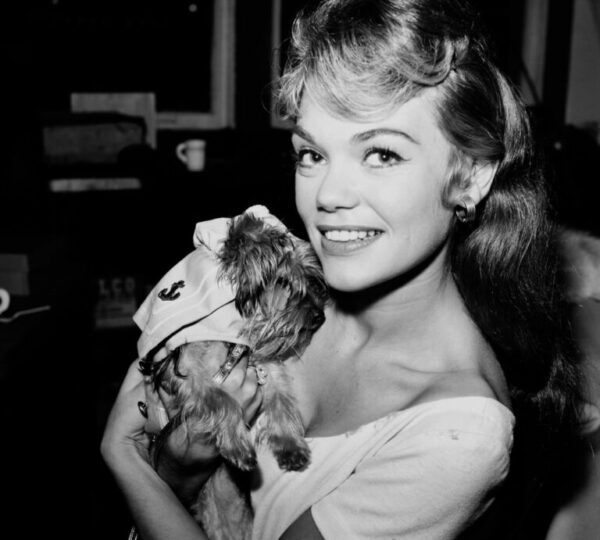For decades, Dyan Cannon graced the silver screen with a beauty, charm, and presence that seemed to exist outside of time.
From the glamour of Hollywood’s golden era to more contemporary cinema, her performances captivated audiences with wit, vulnerability, and an effortless sophistication.
Cannon became more than a screen presence—she was an icon, a woman whose career and personal life reflected both the heights of success and the deeply human struggles behind the spotlight.
Her life seemed almost cinematic: critical acclaim, box-office success, and even a love affair with one of Hollywood’s greatest stars, Cary Grant.
Yet behind the glitz, the red carpets, and the applause, Cannon faced challenges that tested her spirit, resilience, and sense of self.
She has always been candid about the complexities of her life, embracing both the triumphs and heartbreaks that shaped her journey.
Today, at 88, she attributes much of her inner peace and stability to faith, a guiding force that helped her navigate the pressures of fame, personal loss, and the relentless scrutiny of Hollywood.

A Star Among Hollywood’s Greats
Cannon’s career is a testament to her versatility, talent, and determination. Her performances spanned genres and generations, earning her recognition as one of Hollywood’s most gifted actresses.
With three Academy Award nominations, three Golden Globe nominations (winning one), and a Saturn Award to her name, Cannon’s talent was acknowledged by critics, peers, and fans alike.
In 1983, she was immortalized with a star on the Hollywood Walk of Fame, a lasting tribute to a career that continues to inspire new generations of actors.
Audiences adored her for films like Bob & Carol & Ted & Alice (1969), The Last of Sheila (1973), Heaven Can Wait (1978), and Deathtrap (1982).
Each role showcased her extraordinary range—from comedy to drama to suspense—allowing her to move seamlessly between genres.
Critics praised her ability to convey intelligence and depth while maintaining a natural charm that made every character relatable and memorable.
She was a rare combination: a glamorous Hollywood actress who also conveyed warmth, authenticity, and emotional nuance on screen.
Despite her professional acclaim, Cannon’s story was never just about movies.
The real drama, growth, and lessons often came off-camera, shaped by love, loss, and the difficult task of staying true to herself amidst powerful expectations from both Hollywood and those closest to her.
The Love That Tested Her Spirit
Dyan Cannon’s relationship with Cary Grant remains one of Hollywood’s most compelling love stories. In 1961, Grant, already an established icon of film, was reportedly sitting alone in his Beverly Hills home late one night when he noticed a young woman on television.
She was Cannon—then in her early twenties—with a cascade of honey-blond hair partially covering one eye, expressive eyes, a button nose, and full lips. Grant was immediately captivated.
Determined to meet her, Grant leveraged his connections in Hollywood, making calls until he discovered where she lived.
Their courtship reflected the glamour and allure of the 1960s Hollywood scene, but it was also an emotionally intense experience for Cannon.
Grant pursued her relentlessly for eight months before she agreed to a first date, initiating a romance that would captivate public attention for years to come.

When they married, Cannon was 28, and Grant was 61. Despite their affection, their union came with significant challenges.
Grant reportedly wanted Cannon to quit her acting career and adhere to his vision of who she should be, including her appearance, behavior, and even her writing.
Cannon complied to maintain the relationship she loved, later reflecting, “I tried to become the woman he imagined, but the harder I tried, the more I lost sight of myself.”
She recounted the subtle pressures of molding herself to his expectations—closing cupboards more gently, driving with exact precision, adjusting her walk and gestures—only to realize that no amount of effort could reconcile her own identity with the life he demanded.
“If you go against your deepest feelings… you’re screwed,” she admitted candidly.
Their marriage lasted three years, ending in 1968. Cannon later described Grant’s behavior as “cruel and inhuman,” alleging emotional manipulation and that he encouraged her to experiment with LSD, which she used only twice.
Court documents revealed that Grant’s annual income in 1967 was roughly $500,000, with a personal fortune exceeding $10 million—a stark illustration of the power dynamics that complicated their relationship.
Walking Away and Reclaiming Herself
Leaving Grant was not easy. “I couldn’t breathe in that atmosphere anymore,” Cannon confessed. Yet, despite the heartbreak, her love for him remained genuine and selfless:
“I didn’t really want anything from him. I just loved him. There was no agenda there.”
Over time, Cannon came to view her experience with Grant through a lens of gratitude rather than resentment. “There are some happy memories with Cary. I’m grateful for the experience.
It’s brought me to be the woman I am today,” she explained. Their divorce, while painful, allowed her to embark on a long journey of self-discovery, empowerment, and renewed purpose.

A Mother’s Greatest Gift
From the marriage came Cannon’s most cherished blessing: her daughter, Jennifer, born in 1966—Cary Grant’s only child. Even after Cannon and Grant separated, their shared devotion to Jennifer remained a stabilizing force in both of their lives.
Cannon has always emphasized the profound joy and responsibility of motherhood, crediting Jennifer with helping her maintain perspective and focus amidst Hollywood’s pressures.
Following Grant’s death in 1986, Cannon was approached with offers to publish a tell-all memoir detailing their marriage. She declined, wanting to preserve dignity and privacy, and to tell her story on her own terms.
Fifteen years later, Jacqueline Kennedy Onassis encouraged her to share her experiences, not solely about Grant, but about relationships, self-discovery, and the lessons learned from navigating love, heartbreak, and fame.
Cannon’s eventual memoir reflected her belief that true insight comes from understanding the human condition and emotional truth, rather than from scandal or sensationalism.
Public Scrutiny and Societal Judgment
Even into her 80s, Cannon has remained visible, attending events, basketball games, and other public appearances. In 2023, new photographs of her sparked strong reactions online.
Fans praised her energy and vitality: “Looks great for 86 and walking—what more could you ask for?” Others were critical, focusing on cosmetic changes and signs of aging: “Too much surgery,” some wrote.
These responses highlight society’s obsession with youth, particularly for women once celebrated for their beauty and glamour.
Cannon, however, has always maintained her poise and confidence, understanding that her self-worth is not determined by external validation or passing trends.
In July 2025, Cannon made another rare public appearance in Los Angeles, taking her dogs for a walk. At 88, she was photographed in casual attire:
a white summer blouse, black flared leggings, a black fedora, and simple sandals. Even in everyday life, she radiates the same grace and vitality that captivated audiences decades earlier, reflecting a life fully lived and hard-earned wisdom.
Faith as a Guiding Force
Throughout her life, faith has served as Cannon’s anchor. “Praying, that’s what keeps me straight,” she explained.
A self-described “big God girl,” she credits spirituality with helping her navigate life’s complexities, including personal loss, heartbreak, and the pressures of Hollywood.
Faith for Cannon is not just internal—it is active. She hosts monthly Bible studies at her home and volunteers weekly with recovering addicts, offering encouragement, mentorship, and hope.
Through these acts, Cannon demonstrates that the meaning of life lies not in fame or public admiration, but in service, compassion, and integrity.
The Woman Behind the Name
Dyan Cannon’s journey from Hollywood’s golden girl to a woman of resilience, faith, and grace is a story of transformation, strength, and self-discovery.
She has faced heartbreak, societal pressures, and public scrutiny, emerging as a woman who defines her own life on her terms.
Reflecting on her life, Cannon often says with humor and warmth, “I have to say that it took me a while to find happiness, but I’m a happy puppy now.”
Her story serves as a profound reminder that true beauty and fulfillment are measured not by fame, accolades, or youth, but by inner peace, resilience, and the love cultivated over a lifetime.
From silver screen stardom to spiritual fulfillment, Cannon exemplifies a life lived fully, embracing both triumphs and trials.
She continues to inspire generations not merely as a Hollywood icon, but as a woman who chose herself, her faith, and her family above all else—a legacy that transcends Hollywood glamour and endures in the hearts of those she has touched.
Her journey reminds us all: the most remarkable stories are not those told on screen, but the ones lived fully, honestly, and with courage behind the cameras of life.
For decades, Dyan Cannon graced the silver screen with a beauty, charm, and presence that seemed to exist outside of time.
From the glamour of Hollywood’s golden era to more contemporary cinema, her performances captivated audiences with wit, vulnerability, and an effortless sophistication.
Cannon became more than a screen presence—she was an icon, a woman whose career and personal life reflected both the heights of success and the deeply human struggles behind the spotlight.
Her life seemed almost cinematic: critical acclaim, box-office success, and even a love affair with one of Hollywood’s greatest stars, Cary Grant.
Yet behind the glitz, the red carpets, and the applause, Cannon faced challenges that tested her spirit, resilience, and sense of self.
She has always been candid about the complexities of her life, embracing both the triumphs and heartbreaks that shaped her journey.
Today, at 88, she attributes much of her inner peace and stability to faith, a guiding force that helped her navigate the pressures of fame, personal loss, and the relentless scrutiny of Hollywood.

A Star Among Hollywood’s Greats
Cannon’s career is a testament to her versatility, talent, and determination. Her performances spanned genres and generations, earning her recognition as one of Hollywood’s most gifted actresses.
With three Academy Award nominations, three Golden Globe nominations (winning one), and a Saturn Award to her name, Cannon’s talent was acknowledged by critics, peers, and fans alike.
In 1983, she was immortalized with a star on the Hollywood Walk of Fame, a lasting tribute to a career that continues to inspire new generations of actors.
Audiences adored her for films like Bob & Carol & Ted & Alice (1969), The Last of Sheila (1973), Heaven Can Wait (1978), and Deathtrap (1982).
Each role showcased her extraordinary range—from comedy to drama to suspense—allowing her to move seamlessly between genres.
Critics praised her ability to convey intelligence and depth while maintaining a natural charm that made every character relatable and memorable.
She was a rare combination: a glamorous Hollywood actress who also conveyed warmth, authenticity, and emotional nuance on screen.
Despite her professional acclaim, Cannon’s story was never just about movies.
The real drama, growth, and lessons often came off-camera, shaped by love, loss, and the difficult task of staying true to herself amidst powerful expectations from both Hollywood and those closest to her.
The Love That Tested Her Spirit
Dyan Cannon’s relationship with Cary Grant remains one of Hollywood’s most compelling love stories. In 1961, Grant, already an established icon of film, was reportedly sitting alone in his Beverly Hills home late one night when he noticed a young woman on television.
She was Cannon—then in her early twenties—with a cascade of honey-blond hair partially covering one eye, expressive eyes, a button nose, and full lips. Grant was immediately captivated.
Determined to meet her, Grant leveraged his connections in Hollywood, making calls until he discovered where she lived.
Their courtship reflected the glamour and allure of the 1960s Hollywood scene, but it was also an emotionally intense experience for Cannon.
Grant pursued her relentlessly for eight months before she agreed to a first date, initiating a romance that would captivate public attention for years to come.

When they married, Cannon was 28, and Grant was 61. Despite their affection, their union came with significant challenges.
Grant reportedly wanted Cannon to quit her acting career and adhere to his vision of who she should be, including her appearance, behavior, and even her writing.
Cannon complied to maintain the relationship she loved, later reflecting, “I tried to become the woman he imagined, but the harder I tried, the more I lost sight of myself.”
She recounted the subtle pressures of molding herself to his expectations—closing cupboards more gently, driving with exact precision, adjusting her walk and gestures—only to realize that no amount of effort could reconcile her own identity with the life he demanded.
“If you go against your deepest feelings… you’re screwed,” she admitted candidly.
Their marriage lasted three years, ending in 1968. Cannon later described Grant’s behavior as “cruel and inhuman,” alleging emotional manipulation and that he encouraged her to experiment with LSD, which she used only twice.
Court documents revealed that Grant’s annual income in 1967 was roughly $500,000, with a personal fortune exceeding $10 million—a stark illustration of the power dynamics that complicated their relationship.
Walking Away and Reclaiming Herself
Leaving Grant was not easy. “I couldn’t breathe in that atmosphere anymore,” Cannon confessed. Yet, despite the heartbreak, her love for him remained genuine and selfless:
“I didn’t really want anything from him. I just loved him. There was no agenda there.”
Over time, Cannon came to view her experience with Grant through a lens of gratitude rather than resentment. “There are some happy memories with Cary. I’m grateful for the experience.
It’s brought me to be the woman I am today,” she explained. Their divorce, while painful, allowed her to embark on a long journey of self-discovery, empowerment, and renewed purpose.

A Mother’s Greatest Gift
From the marriage came Cannon’s most cherished blessing: her daughter, Jennifer, born in 1966—Cary Grant’s only child. Even after Cannon and Grant separated, their shared devotion to Jennifer remained a stabilizing force in both of their lives.
Cannon has always emphasized the profound joy and responsibility of motherhood, crediting Jennifer with helping her maintain perspective and focus amidst Hollywood’s pressures.
Following Grant’s death in 1986, Cannon was approached with offers to publish a tell-all memoir detailing their marriage. She declined, wanting to preserve dignity and privacy, and to tell her story on her own terms.
Fifteen years later, Jacqueline Kennedy Onassis encouraged her to share her experiences, not solely about Grant, but about relationships, self-discovery, and the lessons learned from navigating love, heartbreak, and fame.
Cannon’s eventual memoir reflected her belief that true insight comes from understanding the human condition and emotional truth, rather than from scandal or sensationalism.
Public Scrutiny and Societal Judgment
Even into her 80s, Cannon has remained visible, attending events, basketball games, and other public appearances. In 2023, new photographs of her sparked strong reactions online.
Fans praised her energy and vitality: “Looks great for 86 and walking—what more could you ask for?” Others were critical, focusing on cosmetic changes and signs of aging: “Too much surgery,” some wrote.
These responses highlight society’s obsession with youth, particularly for women once celebrated for their beauty and glamour.
Cannon, however, has always maintained her poise and confidence, understanding that her self-worth is not determined by external validation or passing trends.
In July 2025, Cannon made another rare public appearance in Los Angeles, taking her dogs for a walk. At 88, she was photographed in casual attire:
a white summer blouse, black flared leggings, a black fedora, and simple sandals. Even in everyday life, she radiates the same grace and vitality that captivated audiences decades earlier, reflecting a life fully lived and hard-earned wisdom.
Faith as a Guiding Force
Throughout her life, faith has served as Cannon’s anchor. “Praying, that’s what keeps me straight,” she explained.
A self-described “big God girl,” she credits spirituality with helping her navigate life’s complexities, including personal loss, heartbreak, and the pressures of Hollywood.
Faith for Cannon is not just internal—it is active. She hosts monthly Bible studies at her home and volunteers weekly with recovering addicts, offering encouragement, mentorship, and hope.
Through these acts, Cannon demonstrates that the meaning of life lies not in fame or public admiration, but in service, compassion, and integrity.
The Woman Behind the Name
Dyan Cannon’s journey from Hollywood’s golden girl to a woman of resilience, faith, and grace is a story of transformation, strength, and self-discovery.
She has faced heartbreak, societal pressures, and public scrutiny, emerging as a woman who defines her own life on her terms.
Reflecting on her life, Cannon often says with humor and warmth, “I have to say that it took me a while to find happiness, but I’m a happy puppy now.”
Her story serves as a profound reminder that true beauty and fulfillment are measured not by fame, accolades, or youth, but by inner peace, resilience, and the love cultivated over a lifetime.
From silver screen stardom to spiritual fulfillment, Cannon exemplifies a life lived fully, embracing both triumphs and trials.
She continues to inspire generations not merely as a Hollywood icon, but as a woman who chose herself, her faith, and her family above all else—a legacy that transcends Hollywood glamour and endures in the hearts of those she has touched.
Her journey reminds us all: the most remarkable stories are not those told on screen, but the ones lived fully, honestly, and with courage behind the cameras of life.





